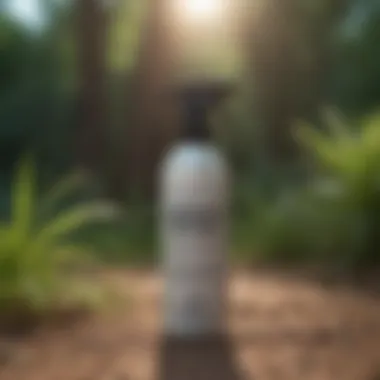Homemade Mosquito Spray: Safe for Dogs and Effective


Intro
Mosquitoes pose a significant threat not only to human comfort but also to the health of our pets, particularly dogs. The quest for effective mosquito control often leads homeowners to consider various products that may be harmful to their furry friends. This article delves into the formulation of a homemade mosquito spray that offers an efficient solution for protecting your yard while prioritizing the well-being of your dogs.
By understanding the natural ingredients that can deter mosquitoes, you can create a spray that is safe and environmentally friendly. This guide provides detailed instructions, essential safety considerations, and the benefits of utilizing natural components over commercial products. Homeowners, gardening enthusiasts, and pet owners alike will find the information valuable in fostering a safe outdoor space for both humans and dogs to enjoy.
Key Ingredients for Homemade Mosquito Spray
The effectiveness of your mosquito spray relies heavily on the ingredients you choose. Certain natural elements are recognized for their ability to repel these pests without harming your dog. Here are some key components:
- Essential Oils: Oils such as lavender, eucalyptus, and citronella are well known for their mosquito-repelling properties. These oils are not only effective but also provide a pleasant aroma.
- Vinegar: White vinegar can be combined with essential oils to enhance the repel properties and extend the mixture’s longevity.
- Witch Hazel: This natural astringent works as a base for your spray and promotes skin health, making it a dual-purpose ingredient.
Benefits of Homemade Mosquito Spray
Creating your mosquito spray at home has several advantages, particularly when it comes to the safety of your pets:
- Control Over Ingredients: You can choose what goes into your spray, ensuring no harmful chemicals are involved.
- Cost-Effective: Homemade sprays are often less expensive than commercial options, saving you money in the long run.
- Eco-Friendly: Using natural ingredients minimizes your environmental impact, contributing to a more sustainable lifestyle.
"The safety and comfort of our pets should never be compromised for the sake of convenience when it comes to pest control."
Safety Considerations for Dog Owners
While making a homemade mosquito spray is generally safer than using commercial products, certain precautions must be taken:
- Always test the spray on a small area of your yard first to ensure no adverse reactions occur.
- Be cautious with essential oils, as some can be harmful to dogs in concentrated forms. Always dilute properly.
- Consider your dog’s unique sensitivities. If your pet has allergies or skin conditions, consult with a veterinarian before use.
Step-by-Step Guide to Making Your Spry
Creating a homemade mosquito spray is simple and can be done in just a few steps. Here’s how to make it:
- Gather Ingredients: Collect concentrated essential oils, vinegar, witch hazel, and a spray bottle.
- Mix Ingredients: Combine 1 cup of vinegar with 10 drops of your chosen essential oils. Add 1 cup of witch hazel. This creates a potent, natural deterrent.
- Transfer to Spray Bottle: Pour the mixture into a clean spray bottle. Shake well before each use.
- Application: Spray around your yard, focusing on areas with standing water or heavy vegetation. Reapply as needed, especially after rain or watering.
Closure
Making a homemade mosquito spray is an effective and safe method for managing mosquitoes in your yard. By utilizing natural ingredients, pet owners can protect their outdoor spaces while ensuring the health of their dogs. This approach not only provides a solution to mosquito issues but fosters a nurturing environment for your pets to thrive in. By adhering to the guidelines and safety measures outlined, you create a balance between comfort and safety in your living space.
Prolusion
Mosquito control is essential for maintaining a comfortable and safe outdoor environment, especially in areas frequented by pets. Homeowners often face a persistent dilemma when it comes to protecting their yards from these pests while ensuring the safety of their dogs. The impact of mosquito bites extends beyond mere discomfort; they can transmit serious diseases to both humans and animals. Failure to address this issue can lead to an unhealthy outdoor experience for both the residents and their pets.
Importance of Mosquito Control
Controlling mosquito populations contributes to overall public health. Mosquitoes are vectors for various diseases, including West Nile virus, Zika virus, and heartworm. Protecting your yard from mosquitoes reduces the likelihood of exposure to these threats. Engaging in proper mosquito management not only enhances your enjoyment of outdoor space, but it also safeguards the health of your furry companions. Therefore, implementing effective mosquito control measures is imperative for any responsible pet owner.
Concerns with Commercial Products
Many commercial mosquito repellents contain synthetic chemicals that may pose health risks to pets. Products with DEET, permethrin, and other toxic substances can be harmful, especially if dogs ingest or come into contact with treated surfaces. Furthermore, pets often have heightened sensitivities to certain compounds, which means an adverse reaction can ensue even from small amounts. This makes many common commercial options unsuitable for households with dogs. The potential side effects necessitate a more cautious approach.
Benefits of Homemade Solutions
Homemade mosquito spray offers a more natural alternative that prioritizes the safety of pets without compromising effectiveness. By using simple, safe ingredients, pet owners can avoid the chemicals found in many products. Additionally, crafting a solution at home allows for better control over the ingredients used. Natural repellents can be tailored to personal preferences, ensuring a scent that is not only pleasant but also functional. The accessibility of such recipes makes it easier for homeowners to engage actively in pest control while ensuring their dogs remain unharmed.
Selecting Safe Ingredients


Selecting safe ingredients is a crucial facet of creating homemade mosquito sprays, especially when considering the safety of pets like dogs. Most commercial insect repellents contain chemicals that could be harmful to animal health. Therefore, it becomes imperative to choose natural alternatives that are effective against mosquitoes while ensuring they pose no risk to your canine companions.
When crafting your own mosquito deterrent, the focus should be on ingredients that have proven efficacy against these pests. Moreover, understanding the nature of these ingredients can help you formulate sprays that serve the dual purpose of keeping mosquitoes at bay and ensuring environmental safety. Let's explore the specific categories of safe ingredients for your homemade spray.
Common Essential Oils
Essential oils play a significant role in homemade mosquito sprays. Oils such as citronella, lavender, peppermint, and tea tree are frequently used due to their insect-repellent properties. Citronella oil, for example, is well-known for deterring mosquitoes. It disrupts the scent that attracts these insects, making it less likely for them to linger in treated areas.
Lavender oil boasts a pleasant aroma for humans, but mosquitoes are less fond of it. This oil not only repels insects but also provides a calming scent. Peppermint oil is another good option; its strong fragrance deters a variety of pests while being safe for dogs once diluted appropriately. Lastly, tea tree oil offers antifungal and antibacterial benefits alongside its mosquito-repelling qualities.
To achieve optimal results, when using essential oils, combining multiple oils can enhance their effectiveness. Mixing citronella with lavender, for instance, may create a robust barrier against mosquitoes.
Herbs and Natural Substitutes
In addition to essential oils, herbs can serve as effective components of your mosquito spray. Plants like rosemary, basil, and mint are not only common in gardens but are also recognized for repelling mosquitoes.
- Rosemary has a strong fragrance that mosquitoes find unappealing. Its lush growth can also add beauty to your yard, while serving a practical role in insect control.
- Basil is another herb that works effectively. Its smell disrupts the olfactory cues that attract mosquitoes. Plus, it can be used in cooking.
- Mint is well known for its refreshing scent for humans but can deter many insects, including mosquitoes. When crushed, its leaves release oils that repel these pests.
You can create a herbal infusion by steeping these herbs in water and using it as a base for your mosquito spray. This method provides a natural and holistic way to use your garden as a defense against insects.
Avoiding Harmful Substances
Awareness of harmful substances is equally important when selecting ingredients. Many commercial sprays contain DEET, permethrin, or other synthetic chemicals that can endanger pet health. These compounds can lead to neurological issues, skin irritations, or worse in dogs.
Therefore, it is critical to avoid:
- Synthetic insecticides: Often toxic to pets and humans.
- Chemical fragrances: These can be irritating and cause allergic reactions.
- Adverse fillers: Many store-bought repellents include substances that serve no purpose in insect repulsion, but can harm your pet.
While choosing natural ingredients may take more effort, the process guarantees a safer environment for your dog, allowing you to enjoy your outdoor spaces free from both mosquitoes and health concerns.
Always read labels and conduct thorough research when selecting ingredients for your homemade mosquito spray.
Recipe for Homemade Mosquito Spray
Creating a homemade mosquito spray is not just a creative endeavor but also a vital step in maintaining a safe outdoor environment, especially for dog owners. This section covers the practical aspects of formulating effective mosquito repellents while ensuring the well-being of pets. Understanding the recipes provided will allow for better pest control, making the outdoor space more enjoyable for both humans and dogs. The use of natural ingredients reduces the risk associated with harsh chemicals, aligning with the growing preference for eco-friendly solutions.
Additionally, this section outlines careful methods for preparation and application, reinforcing the idea that with a little knowledge, there is no need to rely on potentially harmful commercial products.
Essential Oil-Based Recipe
Essential oils serve as a cornerstone for creating a safe and effective mosquito spray. Oils like citronella, eucalyptus, and lemongrass are known for their ability to repel mosquitoes. Not only do they provide a natural barrier against these pests, but they also offer inviting scents that most users appreciate. To create the essential oil-based recipe, follow these steps:
- Ingredients Needed:
- Mixing Process:
- Storage:
- 10 drops citronella essential oil
- 10 drops eucalyptus essential oil
- 10 drops peppermint essential oil
- 2 cups of water
- 1 cup of witch hazel or vodka
- In a spray bottle, combine the essential oils, water, and witch hazel.
- Shake well to blend the ingredients thoroughly.
- Store in a cool, dark place to preserve the oils’ potency for several weeks.
With this recipe, users can enjoy their yard with peace of mind, knowing that the ingredients are safe, natural, and effective against mosquitoes.
Herbal Infusion Recipe
For those interested in a different approach, herbal infusions are another excellent option to repelling mosquitoes naturally. This method utilizes common herbs known for their mosquito-repelling properties. A simple infusion can provide an effective solution. Here’s how to prepare it:


- Ingredients Needed:
- Preparation Steps:
- Usage and Effectiveness:
- 1/2 cup of dried lavender
- 1/2 cup of dried rosemary
- 4 cups of water
- Boil four cups of water and remove it from the heat.
- Add dried lavender and rosemary to the hot water, covering to allow steeping for about 30 minutes.
- Strain the mixture to remove the solid herbs.
- Once cooled, transfer the liquid into a spray bottle.
- This infusion can be sprayed liberally around your yard, offering a gentle yet effective deterrent to mosquitoes.
Application Instructions
To maximize the effectiveness of the homemade mosquito spray, proper application is key. Below are some guidelines:
- Timing Is Important:
Apply the spray in the evening when mosquitoes are most active, generally around dusk. - Consistent Application:
Reapply every couple of hours if you are outdoors, especially in humid or wet conditions where the spray may lose effectiveness. - Target Areas:
Focus on areas where mosquitoes are likely to gather, including near water sources and shaded spots. - Pet Precautions:
Ensure pets are not directly sprayed, and observe them for any signs of irritation when the spray is applied nearby.
By keeping these pointers in mind, users can enjoy a mosquito-free outdoor experience while prioritizing the safety and health of their pets.
Effectiveness of Natural Mosquito Sprays
The application of natural mosquito sprays offers a viable alternative to synthetic options that often contain harsh chemicals. The goal is to create an effective barrier against mosquitoes while ensuring the safety of pets and the environment. Understanding how natural sprays can provide effective mosquito control is critical for homeowners who value both efficacy and health.
Understanding Mosquito Behavior
Recognizing the behaviors and habits of mosquitoes is essential for effective pest control. Mosquitos are attracted to carbon dioxide, body heat, and certain scents. They are most active during dawn and dusk, making these times critical for applying sprays.
Additionally, mosquitoes prefer humid environments. Therefore, managing standing water in your yard can reduce mosquito populations. Using natural sprays in conjunction with strategies aimed at disrupting mosquito attraction can boost overall effectiveness.
Long-Term Application Benefits
Utilizing homemade mosquito sprays regularly can lead to sustained benefits. Repeated application can help establish a protective barrier, making your yard less appealing to these pests. Over time, the continual use of natural sprays can disrupt mosquito breeding cycles and reduce their numbers significantly.
Furthermore, many natural ingredients, such as essential oils, carry properties that repel mosquitoes effectively without the toxic side effects of commercial products. This means that homeowners can enjoy a mosquito-free outdoor space while contributing positively to the environment.
Complementary Measures
In addition to using natural sprays, several complementary methods can enhance the effectiveness of mosquito control strategies.
- Remove stagnant water: Mosquitoes breed in standing water. Regularly empty bird baths, planters, and any containers that hold rainwater.
- Introduce predators: Encourage beneficial insects such as dragonflies or use fish like guppies in water features to eat mosquito larvae.
- Plant mosquito-repelling flora: Certain plants like lavender and marigolds can repel mosquitoes. Incorporating these into your yard can create a multi-faceted defense.
The use of natural mosquito sprays, paired with these complementary measures, can result in a more holistic approach to pest management.
Safety Precautions for Pets
When creating a homemade mosquito spray, it is crucial to consider the safety of your pets, particularly dogs. The ingredients in the spray can directly impact the health and well-being of your furry companions. This section will focus on identifying potential toxic components, observing your dog for any adverse reactions, and general tips to ensure a safe environment for pets.
Identifying Toxic Ingredients
Understanding which ingredients are harmful to dogs is fundamental when preparing mosquito repellent. Essential oils like tea tree oil, cinnamon oil, and clove oil can be detrimental if ingested. Certain herbs and plants, while natural, may also pose risks. Here are some key points to keep in mind:
- Avoid toxic essential oils: Oils from eucalyptus, ylang-ylang, and wintergreen can cause distress or serious health problems.
- Consider natural deterrents: Opt for ingredients like lavender, lemongrass, or peppermint, which tend to be safer for dogs.
- Read labels thoroughly: If you choose pre-made ingredients, ensure they are specifically labeled as pet-friendly.
By ensuring no toxic components are included in your homemade mosquito spray, you create a safer environment for your furry friends.
Monitoring Your Dog's Reaction
Once you have applied the homemade mosquito spray in your yard, it is essential to closely monitor your dog’s behavior and reactions. Animals can be sensitive, and even small amounts of certain substances might elicit unexpected responses.


Here are steps to follow:
- Observe behavior changes: Be vigilant to see if your dog begins to scratch excessively, show signs of irritation, or refuse to enter the treated area.
- Check for allergic reactions: Symptoms like swelling, redness, or vomiting should prompt you to consult your veterinarian immediately.
- Introduce gradually: Expose your dog to the sprayed area for short periods initially. Increase their exposure gradually while monitoring their responses.
Close observation can help identify any issues early and ensure your dog’s comfort and safety.
General Pet Safety Tips
Ensuring your pet remains safe while you control mosquito populations can be straightforward if you follow some practical tips:
- Limit access post-application: After applying the spray, prevent your dog from accessing the area for several hours to allow the solution to dry and settle.
- Create a safe zone: Set up a designated area in your yard that is free of chemical exposure, ensuring your pet has a safe refuge.
- Regular vet check-ups: Keep up with regular veterinary visits. Discuss any concerns about mosquito sprays and your pet’s health as a preventive measure.
By adopting these practices, you contribute to a healthy and safe environment for both your pets and your family while also managing the mosquito population effectively.
Environmental Considerations
Homemade mosquito sprays must be crafted with an awareness of their environmental impact. While creating effective solutions for mosquito control, it is imperative to consider the sustainability and ecological footprint of your chosen ingredients. Using natural resources wisely not only exhibits responsibility but also leads to long-term benefits for the ecosystem. When formulating your mosquito spray, it’s worth paying attention to how these choices affect both local wildlife and the health of your gardening spaces.
Sustainability of Ingredients
Using sustainable ingredients is a crucial factor in creating a homemade mosquito spray. Essential oils like lavender and eucalyptus can be derived from plants that are responsibly cultivated. The practice of sourcing these materials from local, organic farms can minimize their carbon footprint and support local economies.
Additionally, choosing biodegradable and non-toxic components reduces waste and prevents pollution. For instance, using vinegar or witch hazel instead of chemical solvents not only enhances the safety of your mosquito repellent but also ensures that you are not introducing harmful substances into your environment.
"The choice of ingredients directly influences the ecological balance within your yard."
It’s wise to research suppliers and confirm that these natural resources are harvested in a way that doesn’t deplete their populations.
Impact on Local Ecosystems
Every ingredient you select can influence the surrounding ecosystem. Some essential oils, while effective for repelling mosquitoes, could potentially deter beneficial insects or even birds when applied excessively. For example, strong scents from oils may create an unwelcoming environment for pollinators like bees. Thus, moderation in usage is essential.
Moreover, introducing new plants that are not native can disrupt local biodiversity. Before planting any herbs meant for mosquito control, ensure they can coexist with existing flora and fauna without causing an imbalance. By fostering an environment that supports diverse life forms, you contribute to a healthier local ecosystem.
Promoting Biodiversity
Utilizing homemade mosquito sprays can help promote biodiversity in your garden. By opting for plant-based repellents, you'd encourage the growth of a more diverse range of flora. This, in turn, supports various forms of wildlife. Changes in landscaping to include native plants not only improve mosquito control but also offer habitats and food sources for local insects, birds, and other wildlife.
Additionally, considering companion planting strategies can enhance both pest control and plant health. Certain plants naturally repel mosquitoes while attracting beneficial insects that can manage populations of pests. Emphasizing biodiversity becomes a holistic approach to pest management by creating a balanced ecosystem.
Finale
This article emphasizes the significance of developing a homemade mosquito spray for outdoor yards while ensuring safety for pets, particularly dogs. As the prevalence of mosquitoes poses both a nuisance and health risks to humans and animals, finding effective yet safe solutions is crucial. Homemade sprays allow homeowners to take control of their environment using natural ingredients, which can reduce dependency on chemical alternatives. The discussion about creating such sprays encompasses many benefits, including cost-effectiveness, environmental sustainability, and most importantly, pet safety.
Summary of Benefits
Creating a homemade mosquito spray offers numerous advantages. First, it is inexpensive compared to store-bought options. Essential oils and herbs are often readily available, reducing overall costs. Moreover, the ability to customize the formula ensures you choose what you feel comfortable using in your yard. Natural ingredients are less likely to negatively impact local ecosystems, thus maintaining a balanced environment.
Additionally, homemade solutions generally have a lower chance of causing allergic reactions in pets. When using generic insect repellents, the risk of exposure to harmful chemicals increases. Crafting a DIY mosquito spray significantly mitigates this risk. For dog owners, knowing the ingredients they use not only ensures their pet’s safety but also provides peace of mind.
Encouragement of Safe Practices
Advocating for safe practices is vital when handling any form of pest control. Before applying your homemade spray, always conduct a patch test on a small area of your yard. Monitor your dog's behavior during and after application. If your pet shows any signs of discomfort or unusual reactions, it is important to discontinue use immediately and consult with a veterinarian.
Furthermore, keeping your yard clean and tidy can also help in mosquito prevention. Eliminating standing water, trimming overgrown plants, and removing debris can greatly reduce mosquito habitats. This not only means less infestation but also ensures a healthier environment for both humans and pets.
Future Considerations for Pest Control
Looking ahead, homeowners should remain informed about advances in natural pest control technologies. New studies continually emerge, offering insights into effective methods of insect control that are pet-friendly and environmentally responsible. Staying updated can lead to improved formulations and additional protective measures to enhance yard safety. Consider researching and experimenting with new natural repellents that may emerge in the market or from home remedies.
Ultimately, pest control is not a one-time task but a continuous process that requires diligence and adaptability. As homeowners grow increasingly aware of the impact of chemicals on both the environment and their pets, the trend toward natural, homemade solutions is likely to rise.



